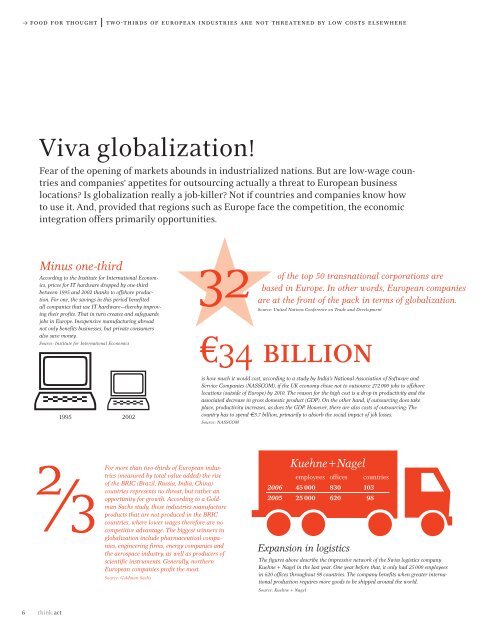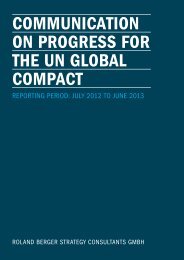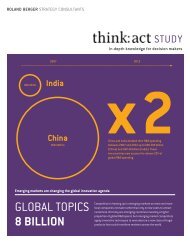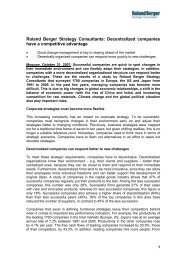issue 9 - Roland Berger
issue 9 - Roland Berger
issue 9 - Roland Berger
You also want an ePaper? Increase the reach of your titles
YUMPU automatically turns print PDFs into web optimized ePapers that Google loves.
p food for thought<br />
two-thirds of european industries are not threatened by low costs elsewhere<br />
Viva globalization!<br />
Fear of the opening of markets abounds in industrialized nations. But are low-wage countries<br />
and companies’ appetites for outsourcing actually a threat to European business<br />
locations? Is globalization really a job-killer? Not if countries and companies know how<br />
to use it. And, provided that regions such as Europe face the competition, the economic<br />
integration offers primarily opportunities.<br />
Minus one-third<br />
According to the Institute for International Economics,<br />
prices for IT hardware dropped by one-third<br />
between 1995 and 2002 thanks to offshore production.<br />
For one, the savings in this period benefited<br />
all companies that use IT hardware—thereby improving<br />
their profits. That in turn creates and safeguards<br />
jobs in Europe. Inexpensive manufacturing abroad<br />
not only benefits businesses, but private consumers<br />
also save money.<br />
Source: Institute for International Economics<br />
32<br />
of the top 50 transnational corporations are<br />
based in Europe. In other words, European companies<br />
are at the front of the pack in terms of globalization.<br />
Source: United Nations Conference on Trade and Development<br />
€34 billion<br />
1995 2002<br />
is how much it would cost, according to a study by India’s National Association of Software and<br />
Service Companies (NASSCOM), if the UK economy chose not to outsource 272 000 jobs to offshore<br />
locations (outside of Europe) by 2010. The reason for the high cost is a drop in productivity and the<br />
associated decrease in gross domestic product (GDP). On the other hand, if outsourcing does take<br />
place, productivity increases, as does the GDP. However, there are also costs of outsourcing: The<br />
country has to spend €5.7 billion, primarily to absorb the social impact of job losses.<br />
Source: NASSCOM<br />
2 3<br />
/<br />
For more than two-thirds of European industries<br />
(measured by total value added) the rise<br />
of the BRIC (Brazil, Russia, India, China)<br />
countries represents no threat, but rather an<br />
opportunity for growth. According to a Goldman<br />
Sachs study, these industries manufacture<br />
products that are not produced in the BRIC<br />
countries, where lower wages therefore are no<br />
competitive advantage. The biggest winners in<br />
globalization include pharmaceutical companies,<br />
engineering firms, energy companies and<br />
the aerospace industry, as well as producers of<br />
scientific instruments. Generally, northern<br />
European companies profit the most.<br />
Source: Goldman Sachs<br />
2006<br />
2005<br />
Kuehne+Nagel<br />
employees offices<br />
45 000 830<br />
25 000 620<br />
Expansion in logistics<br />
countries<br />
103<br />
98<br />
The figures above describe the impressive network of the Swiss logistics company<br />
Kuehne + Nagel in the last year. One year before that, it only had 25 000 employees<br />
in 620 offices throughout 98 countries. The company benefits when greater international<br />
production requires more goods to be shipped around the world.<br />
Source: Kuehne + Nagel<br />
6

















